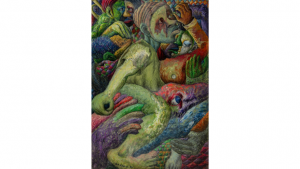The perennial question of staying inspired and producing good work has bedeviled creatives in the ad industry from its very beginnings. For Chris Gotz, the chief creative officer of Ogilvy & Mather South Africa, it begins with holding on to the innocence and unbridled expression of childhood.
“At school, children’s dreams are brutally scooped out of them to make space for nine times table,” he tells the audience at Design Indaba Conference 2014. “We live in a world where writing stories, drawing pictures and dancing are really cool for children but are largely frowned upon as you get older.
Pooling creative skills was a key part of Ogilvy & Mather South Africa’s reinvention after the financial slump of 2008. Collaboration was imperative to create the kinds of large, integrated campaigns it has since become known for.
His presentation – a kind of meditation on the nature of creativity – presents a number of successful campaigns by Ogilvy & Mather that highlight the power of creative thinking to come up with innovative solutions.
An important part of being creative is feeling full of possibility.
Creatives need to face their fear, take risks, stay open to the moment, not get lost in the process, Gotz says.
The creative temperament has its pitfalls, he continues. “Creatives get down very easily. We get winded and bogged down by process. Often we get becalmed,” he says. “We should stay alert. Our radar should be up to what might happen at any given moment.”
With all the distractions of mobile technology, he worries that our ability to notice moments of accidental poetry is shrinking. We are relying more and more on information we find online.
“A lot of the stuff we discover on the Web has been put there by somebody else, it’s been curated by somebody else. We didn’t actually find it,” Gotz states. “We need to get out there and look at stuff a little bit more.”
He concludes: “I think we are suffering from a deficit of primary evidence.”









